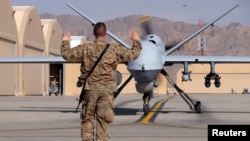France has decided to arm its surveillance drones in West Africa as part of counter-terrorism operations against Islamist militants, Defense Minister Florence Parly said on Tuesday.
French President Emmanuel Macron has made fighting Islamist militants his primary foreign policy objective and the move to armed drones fits into a more aggressive policy at a time when it looks increasingly unlikely Paris will be able to withdraw from the region in the medium to long-term.
France has six Reapers
France currently has five unarmed Reaper reconnaissance drones positioned in Niger's capital Niamey to support its 4,000-strong Barkhane counter-terrorism operation in Africa, and one in France.
“Beyond our borders, the enemy is more furtive, more mobile, disappears into the vast Sahel desert and dissimulates himself amidst the civilian population,” Parly said in a speech to the military.
“Facing this, we cannot remain static. Our methods and equipment must adapt. It is with this in mind that I have decided to launch the process to arm our intelligence and surveillance drones.”
A further six of 12 Reaper drones, built by U.S. firm General Atomics and ordered after France's 2013 intervention in Mali to eventually replace its EADS-made Harfang drones, are due to be delivered by 2019.
The defence ministry said on Tuesday the new drones would be delivered with Hellfire missiles while the existing six would be armed by 2020, possibly with European munitions.
Civilian casualties a concern
Previous French administrations have shied away from purchasing armed drones, fearing a possible increase in civilian casualties.
Al-Qaida's north African wing AQIM and related Islamist groups were largely confined to the Sahara desert until they hijacked a rebellion by ethnic Tuareg separatists in Mali in 2012, and then swept south.
French forces intervened the following year to prevent them taking Mali's capital, Bamako, but they have since gradually expanded their reach across the region, launching high-profile attacks in Mali, Burkina Faso and Ivory Coast, as well as much more frequent, smaller attacks on military targets.
Armed drones offer quick response
At the end of July, at the military base in Niger, officers and pilots had told Reuters it was imperative to arm the drones to be more efficient and quick in tackling jihadist groups.
“In the future, armed drones will enable us to accompany surveillance ... with the capacity to strike at the opportune moment. We will be able to gain in efficiency and limit the risk of collateral damage," Parly said.
France is also working with Germany, Italy and Spain to develop a European drone, which is expected to be ready by 2025.






